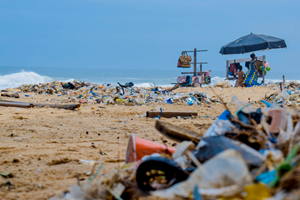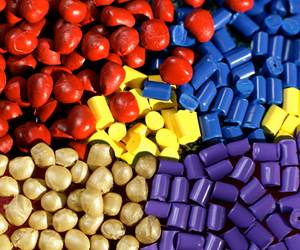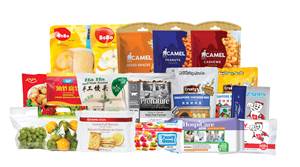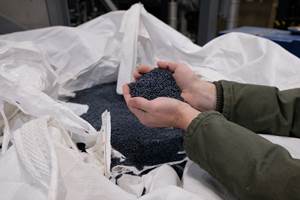Resin Makers Battle Weak Prices
Despite widespread weakness in thermoplastic prices, resin producers are attempting new hikes in PE and engineering resins, including ABS.
Despite widespread weakness in thermoplastic prices, resin producers are attempting new hikes in PE and engineering resins, including ABS. One thermoset supplier announced a surcharge tied specifically to higher energy and fuel costs.
PE hike resurrected
The 5¢/lb PE price hike that was announced for April 1 appeared to have expired from neglect by August. However, it has suddenly been reborn. Huntsman and Dow reintroduced it last month with an effective date of Oct. 1. At press time, similar actions were under study by other producers.
Contributing factors: Suppliers point to the sharp rise in oil prices and its impact on ethylene monomer. Moreover, softer resin prices in the last few months have eroded at least half of the 8¢/lb accumulated through two previous price hikes this year. All that remains is a net increase of 4¢ for film grades and 3¢ for molding grades.
Industry sources have predicted that ample new PE capacity coming on stream will exert downward pressure on resin prices for the rest of this year and into the next. Says one supplier, “The overhang of new capacity is having a great impact on buyers, who are expecting better price deals.”
PP tabs soft
Polypropylene resin tabs are weak, with the last price initiative of 3-4¢/lb having fallen by the wayside.
Contributing factors: New resin capacity is putting a heavy lid on prices and could even force them lower. Dow is expected to start up its new 550-million-lb/yr plant in Texas toward the end of the year. Resin tabs are now following the monomer’s price, which is trending downward owing to a glut in supply.
PVC prices keep falling
Commodity PVC resins have dropped a penny a month since they peaked in June. Some siding extruders say resin is down 3¢/lb since June, while some makers and users of pipe grade peg the drop at 4¢ over the same time frame, including a 2¢ drop in August alone. On the other hand, users of specialized sheet and bottle grades may have seen no price decrease at all. Prices of commodity grades were expected to drift lower by another penny in September.
Contributing factors: Construction markets slumped, weakening demand for pipe and siding. Even export prices are low. Resin producers cut back production, but some now say they didn’t cut back enough to stiffen prices.
PS prices still flat
Polystyrene producers and users say prices were flat in mid-September despite indications that styrene monomer prices were headed higher. Monomer producers announced a 2¢ hike for September, but at press time it was too soon to say whether it would take effect.
Contributing factors: Processors say packaging demand is steady and flat. CD jewel-box markets, however, have slowed. And pricing for exports to the Far East is also down.
Engineering resins jump
Price increases of 8¢/lb set for Sept. 15 were announced by Dow Plastics for SAN, ABS, and PC/ABS, along with a 10¢/lb hike for polycarbonate. Note that Dow had announced an 8¢ across-the-board increase on all ABS resins for July 1. But due to “competitive pressure,” the company issued a 5¢ temporary voluntary allowance (TVA) on pipe and fitting grades in mid-July. The latest 8¢/lb increase is across the board, so it effectively still leaves pipe and fitting grades 5¢ behind other ABS resins. At press time, neither GE, Bayer, nor BASF would confirm any price increases on their materials. As for polycarbonate, Dow also appears to be flying solo with its 10¢/lb increase.
At press time, Dow opened another front by announcing a 12¢/lb increase for all Vydyne nylon 66 and 66/6 resins, effective Oct. 15.
Surcharge on vinyl ester
Dow said last month that it will impose an energy and fuel surcharge on all shipments of Derakane vinyl esters as of Oct. 15. The surcharge is $100 per truckload and $25 for ltl orders.
BFGoodrich Hikes TPUs
BFGoodrich joined other producers of thermoplastic urethanes in raising its prices 5% as of Oct. 15. The company also raised the minimum order quantity from 50 lb to 500 lb.
Related Content
Fungi Makes Meal of Polypropylene
University of Sydney researchers identify two strains of fungi that can biodegrade hard to recycle plastics like PP.
Read MoreFundamentals of Polyethylene – Part 6: PE Performance
Don’t assume you know everything there is to know about PE because it’s been around so long. Here is yet another example of how the performance of PE is influenced by molecular weight and density.
Read MoreFlexible-Film Processor Optimizes All-PE Food Packaging
Tobe Packaging’s breakthrough was to create its Ecolefin PE multilayer film that could be applied with a specialized barrier coating.
Read MoreNew Facility Refreshes Post-Consumer PP by Washing Out Additives, Contaminants
PureCycle prepares to scale up its novel solvent recycling approach as new facility nears completion.
Read MoreRead Next
Beyond Prototypes: 8 Ways the Plastics Industry Is Using 3D Printing
Plastics processors are finding applications for 3D printing around the plant and across the supply chain. Here are 8 examples to look for at NPE2024.
Read MoreLead the Conversation, Change the Conversation
Coverage of single-use plastics can be both misleading and demoralizing. Here are 10 tips for changing the perception of the plastics industry at your company and in your community.
Read MoreFor PLASTICS' CEO Seaholm, NPE to Shine Light on Sustainability Successes
With advocacy, communication and sustainability as three main pillars, Seaholm leads a trade association to NPE that ‘is more active today than we have ever been.’
Read More





















